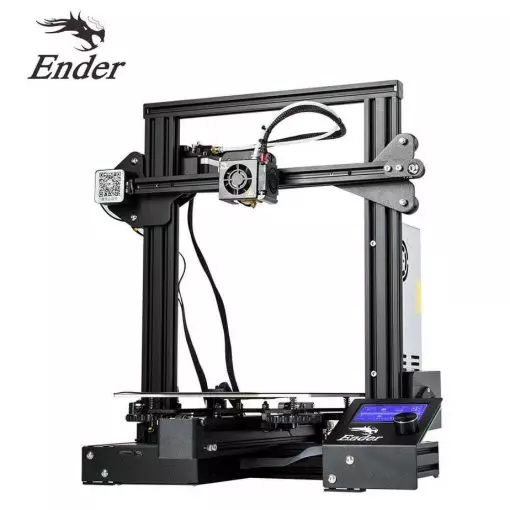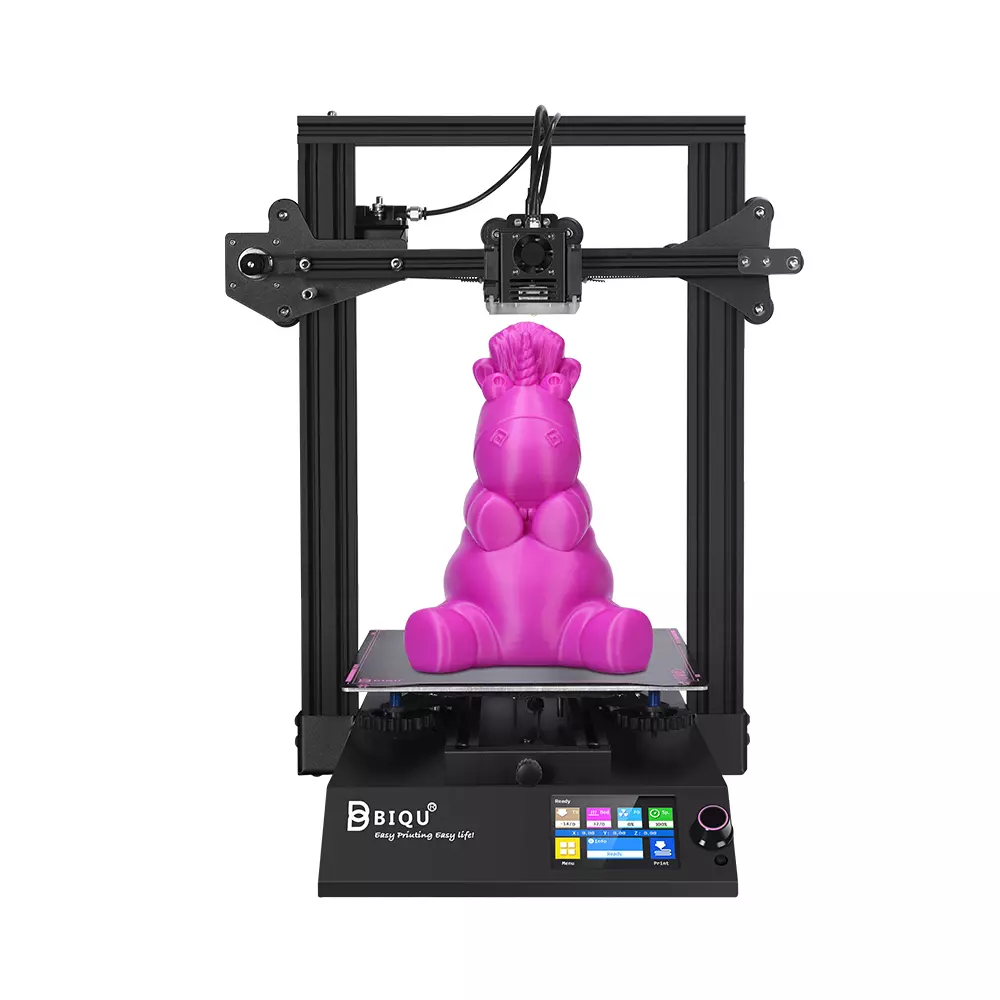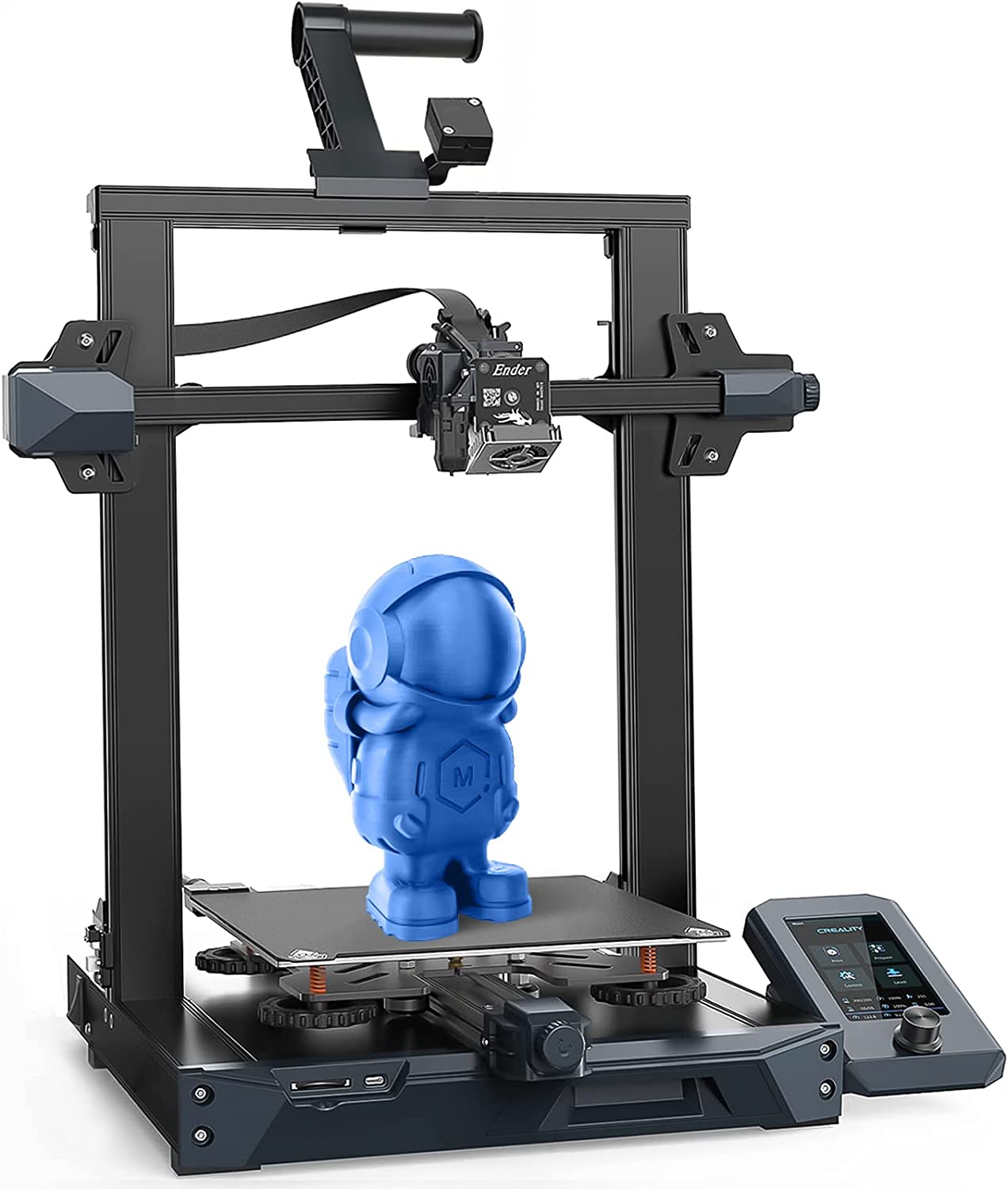Compare Creality 3D Ender 3 vs BigTreeTech BIQU B1 vs Creality 3D Ender 3 S1
Comparison between the best 3D printers
Choose the best 3D printer at the best price. The cheapest 3D printers are here.
Buy a 3D printer here with 3D Fila.
 |
 |
 |
|
| Model | Creality 3D Ender 3[BUY Ender 3] |
BigTreeTech BIQU B1 |
Creality 3D Ender 3 S1[BUY Ender 3 S1] |
| Printing Material | Filament | Filament | Filament |
| Estimated price | $210,00 | $269,00 | $399,00 |
| Fabricante | Creality 3D | BigTreeTech | Creality 3D |
| Release Year | 2018 | 2020 | 2021 |
| Print Volume [mm] | 220x220x250 | 235x235x270 | 220x220x270 |
| Printer Size [mm] | 440x440x465 | 412x402x492 | 455x490x625 |
| Weight [kg] | 6,62 | 8,00 | 9,1 |
| Power Loss Recovery | NO | YES | YES |
| Enclosed printer | NO | NO | NO |
| Bed Leveling | Manual | Manual | Automatic |
| Filament End Sensor | NO | YES | YES |
| Bed type | Heated | Heated | Heated |
| Power supply system | Bowden | Bowden | Direct Drive |
| Standard nozzle | 0,4 | 0,4 | 0,4 |
| Maximum Nozzle Temperature [°C] | 255 | 250 | 260 |
| Maximum Bed Temperature [°C] | 110 | 100 | 100 |
| Maximum printing speed [mm/s] | 180 | 100 | 180 |
| Filament holder | YES | YES | YES |
| Camera for supervision | NO | NO | NO |
| Recommended filaments | PLA, TPU, ABS, PETG | PLA, TPU, ABS, PETG | PLA, TPU, PETG, ABS |
| Recommended slicers | Cura, Simplify, Slic3r | Cura, Simplify, Slic3r | Cura, Simplify, Slic3r, IdeaMaker, Creality Slicer e outros |
| Maximum Resolution [mm] | 0,1 | 0,1 | 0,05 |
| Processor | 8 bits | 32 Bits BTT SKR V 1.4 | |
| Display | Mono | Touchscreen TFT 3,5'' | Display 4,3'' |
| Power Supply | 24V / 270W | 24V / 360W | |
| Connectivity | SD / USB | SD / USB | SD / USB |
| Operating systems | Windows, Mac, Linux | Windows, Mac, Linux | Windows, Mac, Linux |
| Date of registration in the system | 2021-04-13 | 2021-04-14 | 2023-03-28 |
| Release date | 2018 | 2020 | 2021 |
| Extra features | The Ender 3 V1 is a DIY assembly 3D printer, a sales leader since 2017, standing out for its cost-benefit. With a wide printing capacity, it has a CNC machined structure for precision and stability. It offers high-precision prints with low noise, thanks to its innovative V-profile and pulleys. It has a self-adhesive magnetic platform for easy removal of models and excellent adhesion. The Ender 3 heats up quickly, reaching 100°C in 5 minutes, ideal for agile prints. It includes protection against power failures, allowing you to resume printing after interruptions, saving time and material. | The BIQU B1 is an advanced 3D printer with a silent 32-bit BTT SKR V1.4 motherboard and ARM Cortex-M3 CPU, offering DIY interfaces (I2C, SPI, WiFi) and dual Z-axis. Its dual BTT B1 TFT35 V3.0 operating system allows real-time monitoring and multiple printing modes, including G-code visualization effects. It stands out for its BIQU SSS (Super Spring Steel), ensuring easy model adhesion and simplified removal, with the possibility of using it on both sides. It includes a filament sensor, automatically pausing printing in case of filament breakage. The multicolored RGB lights integrated into the hotend allow you to view the printing status even at night. Additional notes include the need for a BIQU-specific Type-C cable and extra interfaces for smart filament sensor and BL Touch. | The Creality Ender 3 S1 printer stands out for its easy assembly and quiet operation. It has automatic bed leveling and a direct drive system, providing high-quality prints. The design is sleek, with flat cables in mesh sleeves and a magnetic bed. The Creality Sprite extruder is lightweight and developed in-house, supporting a maximum nozzle temperature of 260 degrees. It includes a filament run-out sensor and power loss recovery, with a dual Z-axis for greater support and stability. The build plate is flexible steel with PC coating, and the printer supports a wide variety of filaments. |
| Support for multiple colors and materials (AMS and CFS) | NO | NO | NO |
Notes * |
|||
| Cost-benefit | 6 / 10 | 7 / 10 | 7 / 10 |
| Hardware | 0.5 / 10 | 2 / 10 | 2 / 10 |
| Screen | . | . | . |
| Print volume | 3 / 10 | 3 / 10 | 3 / 10 |
| Performance | 1 / 10 | 1 / 10 | 1 / 10 |
| [BUY Ender 3] | [BUY Ender 3 S1] |
Conclusion |
| In summary, the comparison of the three 3D printers—Ender 3, BIQU B1, and Ender 3 S1—presents a clear differentiation along various axes of performance, features, and pricing. The **Ender 3** emerges as the most cost-effective choice, offering essential functionalities and a decent print volume. Its DIY assembly aspect and user-friendly features make it appealing for beginners or those on a budget. However, it lacks advanced capabilities such as power loss recovery and filament sensor, which could be limiting for more experienced users. On the other hand, the **BIQU B1** steps up with enhanced features such as a silent 32-bit motherboard, dual Z-axis, and a filament sensor. These features aim to improve user experience and operational reliability, making it a great option for more demanding users who are willing to spend a bit more for added functionality and modern tech. However, it has a slightly lower print speed compared to the other two models. The **Ender 3 S1** stands out with its high-quality construction and features like automatic bed leveling and a direct drive system. It offers superior performance, particularly with more complex filament types, which may justify its higher price for those serious about 3D printing. Its built-in extras, like the filament sensor and power loss recovery, address common pain points in the printing process, making it more appealing for both pros and enthusiasts. Ultimately, the choice of printer depends on the user’s priorities: those looking for a budget-friendly entry point may favor the Ender 3, while users seeking enhanced capabilities and higher reliability might prefer the BIQU B1 or the Ender 3 S1. Each printer provides a unique balance between features, capabilities, and price, catering to varied user needs and experiences in the realm of 3D printing. |

